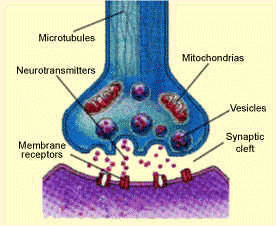Site Designer:
Claire Rosling
Email:
Site Designer:
Claire Rosling
Email:
Serotonin as a neurotransmitter
Serotonin is a neurotransmitter involved in the transmission of nerve impulses. Neurotransmitters are chemical messengers within the brain that allow the communication between nerve cells.
Packets of serotonin (vesicles) are released from the end of the presynaptic cell
 into the synaptic cleft. The serotonin
molecules can then bind to receptor proteins within the postsynaptic cell, which
causes a change in the electrical state of the cell. This change in
electrical state can either excite the cell, passing along the chemical message,
or inhibit it. Excess serotonin molecules
are taken back up by the presynaptic cell and reprocessed.
into the synaptic cleft. The serotonin
molecules can then bind to receptor proteins within the postsynaptic cell, which
causes a change in the electrical state of the cell. This change in
electrical state can either excite the cell, passing along the chemical message,
or inhibit it. Excess serotonin molecules
are taken back up by the presynaptic cell and reprocessed.
The neurons in the brain that release serotonin are found in small dense collections of neurons called Raphe Nuclei. The Raphe Nuclei are found in the medulla, pons and midbrain which are all located at the top of the spinal cord. Serotonergic neurons have axons which project to many different parts of the brain, therefore serotonin affects many different behaviors.
